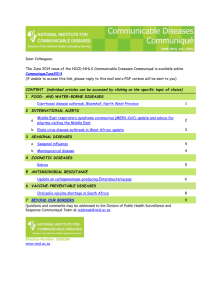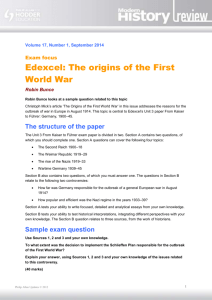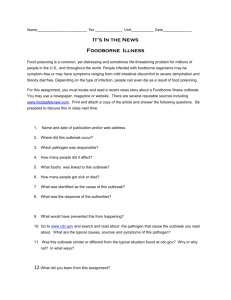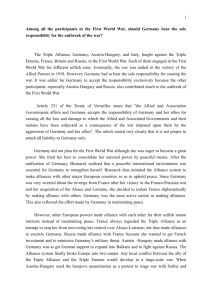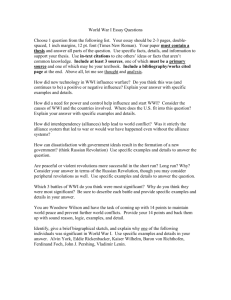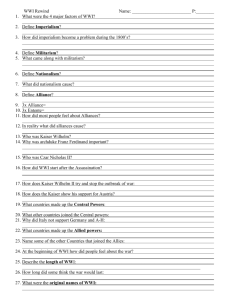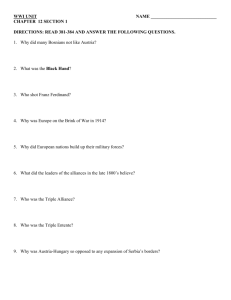Exemplar 7
advertisement
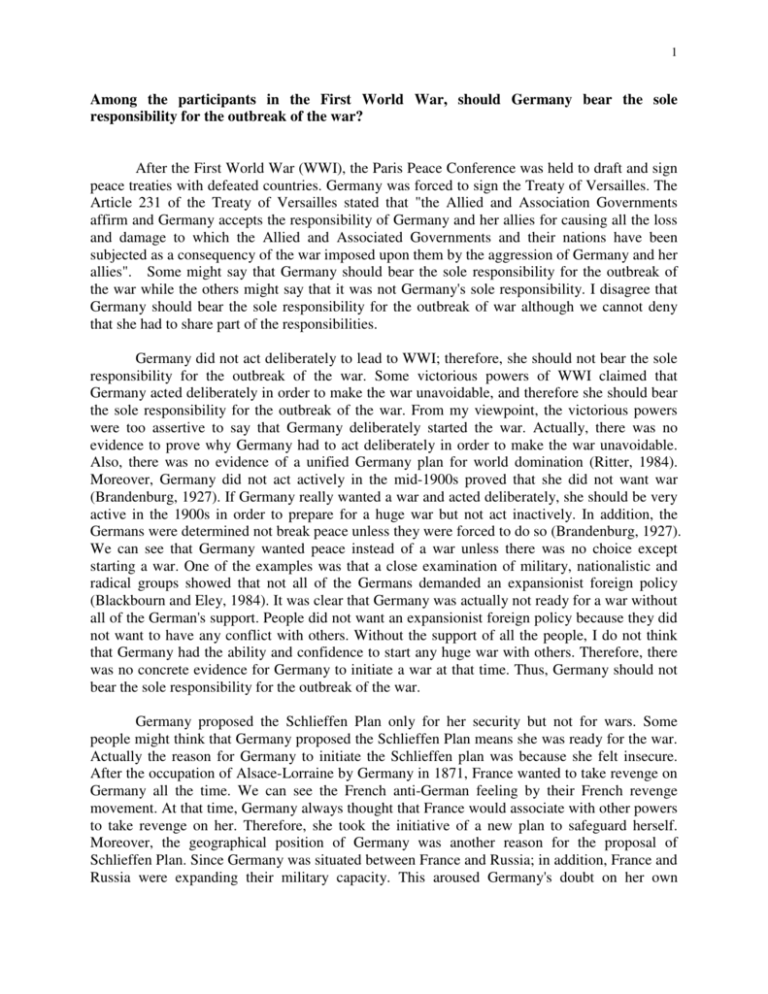
1 Among the participants in the First World War, should Germany bear the sole responsibility for the outbreak of the war? After the First World War (WWI), the Paris Peace Conference was held to draft and sign peace treaties with defeated countries. Germany was forced to sign the Treaty of Versailles. The Article 231 of the Treaty of Versailles stated that "the Allied and Association Governments affirm and Germany accepts the responsibility of Germany and her allies for causing all the loss and damage to which the Allied and Associated Governments and their nations have been subjected as a consequency of the war imposed upon them by the aggression of Germany and her allies". Some might say that Germany should bear the sole responsibility for the outbreak of the war while the others might say that it was not Germany's sole responsibility. I disagree that Germany should bear the sole responsibility for the outbreak of war although we cannot deny that she had to share part of the responsibilities. Germany did not act deliberately to lead to WWI; therefore, she should not bear the sole responsibility for the outbreak of the war. Some victorious powers of WWI claimed that Germany acted deliberately in order to make the war unavoidable, and therefore she should bear the sole responsibility for the outbreak of the war. From my viewpoint, the victorious powers were too assertive to say that Germany deliberately started the war. Actually, there was no evidence to prove why Germany had to act deliberately in order to make the war unavoidable. Also, there was no evidence of a unified Germany plan for world domination (Ritter, 1984). Moreover, Germany did not act actively in the mid-1900s proved that she did not want war (Brandenburg, 1927). If Germany really wanted a war and acted deliberately, she should be very active in the 1900s in order to prepare for a huge war but not act inactively. In addition, the Germans were determined not break peace unless they were forced to do so (Brandenburg, 1927). We can see that Germany wanted peace instead of a war unless there was no choice except starting a war. One of the examples was that a close examination of military, nationalistic and radical groups showed that not all of the Germans demanded an expansionist foreign policy (Blackbourn and Eley, 1984). It was clear that Germany was actually not ready for a war without all of the German's support. People did not want an expansionist foreign policy because they did not want to have any conflict with others. Without the support of all the people, I do not think that Germany had the ability and confidence to start any huge war with others. Therefore, there was no concrete evidence for Germany to initiate a war at that time. Thus, Germany should not bear the sole responsibility for the outbreak of the war. Germany proposed the Schlieffen Plan only for her security but not for wars. Some people might think that Germany proposed the Schlieffen Plan means she was ready for the war. Actually the reason for Germany to initiate the Schlieffen plan was because she felt insecure. After the occupation of Alsace-Lorraine by Germany in 1871, France wanted to take revenge on Germany all the time. We can see the French anti-German feeling by their French revenge movement. At that time, Germany always thought that France would associate with other powers to take revenge on her. Therefore, she took the initiative of a new plan to safeguard herself. Moreover, the geographical position of Germany was another reason for the proposal of Schlieffen Plan. Since Germany was situated between France and Russia; in addition, France and Russia were expanding their military capacity. This aroused Germany's doubt on her own 2 security. She realized that if there was no action to be taken at that time, Germany might be defeated or invaded by others if other powers wanted to expand or take revenge. Therefore, Germany decided to gain the initiative by proposing a military plan (the Schlieffen Plan) first in order to safeguard herself from attacking by any power. The proposal of the Schlieffen Plan was caused by the suspicious actions taken by other powers like Russia; and also her dangerous geographical position. We can understand that it was just a defensive plan for Germany's security. Therefore, Germany should not bear the sole responsibility for the outbreak of the war. Germany initiated the alliance system mainly for her own security. Some historians said that Germany should bear the sole responsibility for the outbreak of WWI because the alliance system initiated by Germany was to prepare for a war and it paved the way for the outbreak of WWI. I do not agree to this statement. First, the main purpose to set the alliance system was to prevent wars from other powers' war-like action. That means if anyone wants to start a war, it will be stopped by the power of an alliance system. Bismarck's aim to set up the alliance system was very positive. Therefore, we should not blame Germany of initiating the alliance system. Second, Germany was actually the victims of the alliance system. In 1882, Germany formed the Triple Alliance with Austria-Hungary and Italy. However, Italy was not a reliable ally because she acted contrariously to her obligations in the Triple Alliance due to a free hand given by France to her. Germany had no choice but to be on the side of Austria-Hungary to avoid isolation. To Germany, Austria-Hungary was the only credible friend. Therefore, she issued "blank cheque" to Austria-Hungary in order to strengthen her alliance and thus herself. Moreover, Germany started the alliance system not because she wanted a war but she felt insecure of facing a two-front war. Actually, Germany gave unconditional support to Austria-Hungary because she wanted to threaten Serbia to give in and, at worst, only a limited local conflict was expected (Carr, 1979). From Carr's words (1979), we can see that Germany had no desire to start a great war and she only wanted to threaten Serbia to back down and give up her interest in Balkan states. From the Germans' sight, they had only thought about the worst situation (of giving unconditional support to Austria-Hungary) which was only a limited local conflict instead of a great war. If you say that the main aim of Germany to form an alliance system was to prepare for a war, I will not deny that Germany should bear the sole responsibility for the outbreak of the war. However, the main aim of forming an alliance by Germany was obviously not the case just like what I mentioned above. To strengthen her alliance, defend herself and also maintain peace in Europe were the chief aims of forming the alliance. Therefore, Germany should not bear the sole responsibility for the outbreak of the war. One thing I would like to supplement to the point I have just mentioned is that the alliance system (1873) initiated by Germany was so far away from the war (1914) about 60 years. If Germany's aim to form the alliance with Austria-Hungary and Italy was to start a war, I think the war should be broken out at the very beginning and after the formation of the first alliance immediately but not happen 60 years later. Also, other powers including the victorious powers had formed alliances at that time not only Germany. If the victorious powers thought that starting the alliance system was not good, they should not have joined ones. If they joined one, that means they also had the responsibility for the outbreak of WWI. Therefore, it was a collective responsibility of all powers rather than a sole responsibility of Germany. Thus, Germany should not bear the sole responsibility for the outbreak of the war. 3 It was not Germany's responsibility to restrain Austria's expansion. One may argue that Germany should bear the sole responsibility for the outbreak of WWI because she failed to restrain Austria's expansion which led to the outbreak of the war. I have to clarify that Germany did advise the Austrian-Hungarian Foreign Minister to act with continence and not to give any signal to raise others' suspicion for war (Carr, 1979). She had tried to persuade Austria-Hungary not to provoke others, especially Serbia, and even not to give any signal for war. However, Austria-Hungary still provoked Serbia into war. It was not the responsibility for Germany to restrain Austria's expansion. Although they were allies, they had their own ideas on making decision for their own country. If you still insist on Germany should restrain Austria's expansion, I would like to ask why Germany has to do so but not other powers? If other powers do not want the wars, they should also stop Austria-Hungary's action by themselves but not blame Germany for the failure to restrain Austria's expansion. Moreover, if Germany always interrupted Austria-Hungary's decision making, Austria-Hungary might feel annoying and even break up the relation as an alliance with Germany. We should have known that Germany was very afraid of losing her only friend, Austria-Hungary. Therefore, she chose to respect Austria-Hungary's will even though she did not want the war happened. From my standpoint, Germany had already tried her best to restrain Austria's expansion. The ultimate decision making was done by Austria-Hungary and, Germany had no guts and even rights to interrupt. Moreover, from Austria's expansion, we can conclude that Austria-Hungary also had the responsibility for the outbreak of the war. Therefore, Germany should not bear the sole responsibility for the outbreak of WWI. Germany should not bear the sole responsibility for the outbreak of WWI because she was not the first country to order mobilization. The country which mobilized the troops first before the eve of WWI should be responsible for the outbreak of the war. This is because if a power mobilizes her troops during the tense period in Europe, this may arouse other powers' suspicions of having any war. The possibility of the outbreak of a war would be very high and the war is even unavoidable. Although Germany had mobilized her troops later after Russia's mobilization, she was not the first country to mobilize. Also, while Russia mobilizing her troops, Germany had sent an ultimatum asking her to stop mobilization within 12 hours. However, Russia refused to do so and the war gradually started. Therefore, we can see that Russia should bear part of the responsibilities for the outbreak of WWI but not Germany's sole responsibility. There were still many pieces of evidence, such as the conflicts between Austria-Hungary and Serbia, to show that it was not Germany's sole responsibility for the outbreak of WWI. What I have mentioned above were just part of the evidence. Although we cannot deny that Germany should bear most of the responsibility for the outbreak of the war; however, we should not neglect other great powers' responsibility at the same time. You may ask that why Germany still accepted the treaty term if she did not think that she had to bear the sole responsibility. The fact was that Germany was a defeated country in WWI, her power had already been weakened during the war. She had no choice but to accept the sole responsibility for the war even though she did not want it. However, it was really unfair to impose that treaty term on Germany because we can find many evidence, such as Austria's expansion, Russia's first mobilization of troops, etc, which showed that it was not Germany's sole responsibility for causing the war. The imposition of this harsh term on Germany was to shift off parts of their responsibilities of causing the war. To me, it was rather a collective responsibility for the outbreak of the war than a sole responsibility 4 because the war would not have broken out without most of the powers' participation. Due to the harsh treaty terms signed by Germany in the Paris Peace Conference, the Germans resented the government and leaders so much. Therefore, it created a favourable circumstance for Hitler. Also, it paved the way for the outbreak of the Second World War (1939-1945). References Blackbourn. D and Eley. G. (1984) The Peculiarities of German History: bourgeois society and politics in nineteenth-century Germany. Oxford: Oxford University Press. Brandenburg. E. (1927) From Bismarck to the World War. London: Oxford University Press. Carr. W. (1979) A History of Germany, 1815-1945 (2nd Edition). London: Edward Arnold Ritter G. (1984) The Origins of the First World War. London: Oxford University Press. Comment: The report presented a one-side account all the way. 評語: 整個報告內容僅集中於一個看法。 評級 Level: L2 評分Marks: 8

